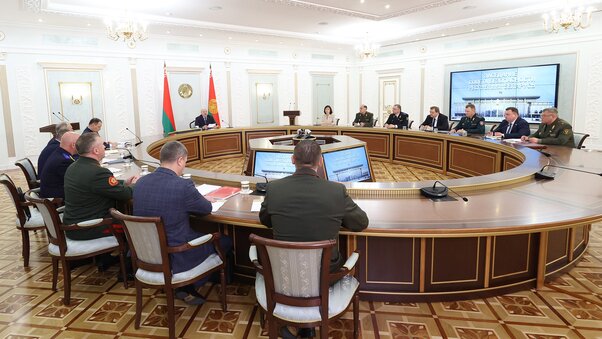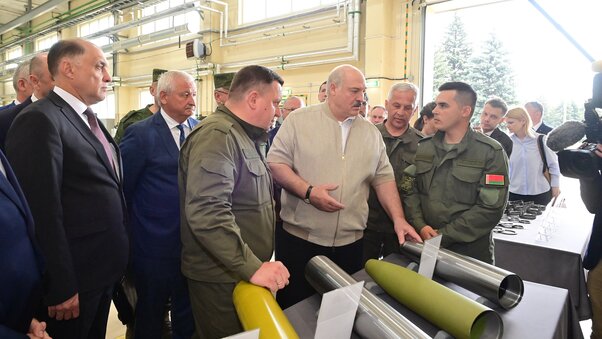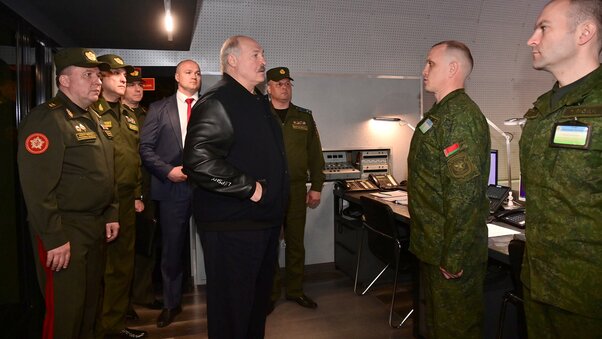Visit to the 56th anti-aircraft missile regiment in Luninets District
- 15
Belarusian President Aleksandr Lukashenko visited the 56th anti-aircraft missile regiment in Luninets District, Brest Oblast on 13 July.
At first, the head of state visited the regiment’s command post, where he was briefed on the performance of air defense duty missions.
After that, the President moved to the regiment's headquarters. Aleksandr Lukashenko toured the premises and studied the infrastructure and the regiment's vehicle park. He was flanked by the defense minister.
A reminder, the situation at the southern border has been one of the hottest topics of late. Aleksandr Lukashenko spoke in detail about it at a rally in the run-up to Independence Day on 2 July. “In no way should we allow any escalation or aggravation. I want the Ukrainian leadership to hear me. The concentration of troops albeit insignificant is very dangerous during combat operations. We’ve analyzed the situation. We understand perfectly well that we need no aggravation. We’ve always said it. Ukrainians understand that we will retaliate,” the head of state said.
Aleksandr Lukashenko asked Ukrainians not to play with fire. “This is very dangerous,” he noted.
According to Aleksandr Lukashenko, the Belarusian border service was put on enhanced security mode. Units of the special operations forces were deployed. The air force and air defense of both Belarus and Russia were on high alert. Missile systems Polonez and Iskander were deployed. “No red lines. There will be a strike with all types of weapons on predetermined targets,” the Belarusian leader warned.
“I’d like to tell you not to worry. Remember what I’ve always told you: everyone should just do their jobs. I guarantee that we will not allow any clashes at the border with Ukraine. This won’t happen,” Aleksandr Lukashenko said at the rally in early July.
Belarusian President Aleksandr Lukashenko held a meeting to discuss the country's military security in the southern operational district.
Taking part in the meeting are State Secretary of the Security Council Aleksandr Volfovich, KGB Chairman Ivan Tertel, Minister of Internal Affairs Ivan Kubrakov, Defense Minister Viktor Khrenin, Chief of the General Staff of the Armed Forces Pavel Muraveiko, Chairman of the State Border Committee Konstantin Molostov, Commander of the Special Operations Forces of the Armed Forces Vadim Denisenko, Commander of the Air Force and Air Defense Andrei Lukyanovich.
“The State Security Committee and the military intelligence reported to me that after we had taken action, the Ukrainians withdrew their armed forces and additional troops from our border (there were many thousands of people there) and overall from the Belarus-Ukraine border area. In other words, those troops that were meant to enhance their military presence left the border,” said the head of state. “If this is so... And this is exactly so. I asked the guys and this regiment [the President visited the 56th anti-aircraft missile regiment in Luninets District]. Both the defense minister and they say that now we have no tensions with the Ukrainians, and I hope there won’t be any,” added Aleksandr Lukashenko.
The head of state emphasized that Belarus did not want this escalation, and it absolutely does not need it now. “Ukraine is even less interested in this. They have enough of other problems,” he noted.
The President recalled that a serious escalation at the southern border was detected a couple of weeks ago. And this caused serious concern among the population, so the head of state had to respond. Aleksandr Lukashenko commented on this after his protocol speech at the meeting in the run-up to Independence Day.
“I tried to the best of my ability to assuage people's concerns, to reassure people that there will be no war, that we will not allow escalation on our border. After all, it is our task, the task of people in uniform, to make sure that the situation is calm and our people can keep working and harvesting (the harvest is rather good). In other words, people were very anxious. Therefore, a decision was made to dispatch a number of military units to the border, including our special operations forces. Our border guards were mobilized and the border security was beefed up. Although they, poor guys, are already seriously overloaded; nevertheless, the country should be protected - border guards are the only ones who walk along the edges of the country, so the border security was reinforced by the border troops,” the President said.
Speaking about additional mobilization of the special operations forces, Aleksandr Lukashenko noted that the situation was already quite tense: “They are having a tough time at this southern border. The 'sling arms' command is given every other day.”
“Thus, we got mobilized, and our troops were also put on alert,” the head of state remarked.
The resulting de-escalation suggests that the head of state’s promise that the military would ensure peace and security was fulfilled. “I promised the people that we would handle this situation,” the Belarusian leader added.
Belarus had to respond to the recent escalation at the border with Ukraine by beefing up border security and reinforcing border guards with army units. After that Ukraine withdrew its troops from the border area and the tensions subsided.
“There should not be any unnecessary moves,” the head of state said.
“I want people to know (I absolutely trust our intelligence): the situation has been stabilized at the Belarus-Ukraine border. Their troops have been removed. Therefore, guys, our troops need to be pulled back from the border, too. It will send them a signal (as we have agreed) that we are not going to fight and we are not going to increase military presence here, except for special operations forces,” the Belarusian leader said.
Aleksandr Lukashenko gave instructions to Commander of the Special Operations Forces of the Armed Forces Vadim Denisenko: “Take care of your guys. Make sure they (special operations forces) stay at the designated areas on a rotational basis. Make things more comfortable for them given such a heat wave. We need several people at these designated facilities on a rotational basis. Take the rest to places of permanent deployment.”
The President ordered to have a look at the Defense Ministry as a whole. “If you need to withdraw troops from somewhere, go ahead. There should not be any unnecessary moves,” he said.
However, Aleksandr Lukashenko warned everyone against missing possible threats from the West. “Since I warned you about it, we have seen that we should be watchful for the West. There is a build-up going on there. Therefore, the guys deployed in the northwestern district should be ready for everything. There are attempts to provoke us in order to drag us into this conflict, this war,” the Belarusian leader emphasized.
Belarusian President Aleksandr Lukashenko wants to discuss further steps related to Ukraine with Russian President Vladimir Putin.
“They [people in Ukraine] look askance at us, they vilify us. Well, they stop short of calling us enemies. We are not enemies for the Ukrainians. I have said it many times. They are our kin. They are like us, like Russians, we need to come to terms quickly. It is absolutely possible. But for this it is necessary to embark on talks. If there is no dialogue, no conversation, there will be escalation and people will die,” the Belarusian leader emphasized.
Commenting on the heat wave that gripped the region, Aleksandr Lukashenko remarked: “What is it like to fight in forty-degree heat... It’s scary even to go outside, but imagine fighting being fully equipped, with a bulletproof vest. This is an unbearable torture for the military. And people die. And these are someone’s children.”
“Therefore, this is an example [the recent de-escalation in the Belarus-Ukraine border area] of how you can come to an agreement by talking. This suggests that there are enough sensible people in Ukraine. Especially among the military. We arrived at an agreement. I think this is a good example for the Ukrainians. The Russians are ready to sit down at the negotiating table and strike a deal. Negotiate and come to terms. So far, pushed by NATO (we saw this at the recent NATO summit), the Ukrainians are fighting till the last Ukrainian is left standing. It's a shame. Indeed, it is imperative to embark on talks. I think we will soon discuss these problems at a meeting with Vladimir Vladimirovich Putin where we will thrash out our plans going forward,” Aleksandr Lukashenko said.


